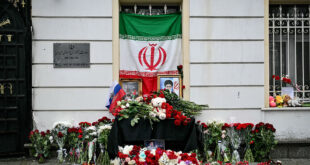TEHRAN (Reuters) — Iran will not suspend uranium enrichment, the key UN demand in a nuclear row with Tehran, Iran’s top nuclear negotiator Ali Larijani said the day before talks with EU foreign policy chief Javier Solana.
Thursday’s meeting between Larijani and Solana, acting on behalf of world powers, will be the first since US and Iranian officials held rare face-to-face discussions in Iraq, although atomic affairs were not on the agenda for the Baghdad meeting.
The United States, which accuses Tehran of seeking to build an atomic bomb, has been leading efforts to isolate Iran over its nuclear programme and also says Iran is stirring up violence in Iraq. Iran denies both charges.
“Suspension is not a solution to Iran’s nuclear issue …
Iran cannot accept suspension,” Larijani told reporters at a Tehran airport before his departure for Madrid, where he will meet Solana.
“We have no conditions and we are ready for constructive talks but we will not accept any preconditions. We are ready to remove concerns over Iran’s atomic issue.” Previous meetings have failed to persuade Tehran to obey UN resolutions demanding it halt enrichment, a process which can be used to make fuel for power stations or bomb material.
“We are ready to hold talks without preconditions, any day, any time, but they (the Europeans) should change their logic and use this opportunity which Iran has created for constructive talks. Previous methods will lead them nowhere,” Larijani said.
‘Discussing solutions’
“We are not against discussing such solutions during talks but the ground should be paved for Iran to continue its nuclear work,” Larijani added.
He said Iran was staying within regulations laid down by the International Atomic Energy Agency (IAEA). The UN watchdog says Iran has to answer questions to clarify its intentions.
The UN Security Council has imposed two sets of sanctions on Iran since December for failing to heed UN demands.
Washington has threatened more steps if the demands are ignored.
US and Iranian envoys to Iraq met in Baghdad on Monday to discuss Iraqi security issues, the sole issue on the agenda.
Washington told Tehran to stop backing militias in Iraq, although Tehran denies any such activity.
“The nuclear issue and Iraq talks are two separate issues.
Of course, in politics, you cannot separate two issues, it will have some affect,” Larijani said without elaborating.
Both sides, which have not had diplomatic ties since Washington cut relations after the 1979 Islamic revolution, described Monday’s discussions as positive.
Iran insists its atomic programme is aimed at making fuel for a network of nuclear power stations it is planning. The country’s first such plant is still being built, with Russian help, and has faced years of delays.
Iran temporarily suspended enrichment under a previous deal with the European Union but that pact collapsed in 2005.
Solana is empowered by the world’s major powers — the United States, Russia, China, Britain, France and Germany as well as the EU — to explore the scope for formal negotiations on a package of economic, technological and political initiatives if Iran suspends enrichment.
 Eurasia Press & News
Eurasia Press & News



